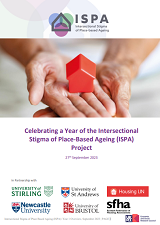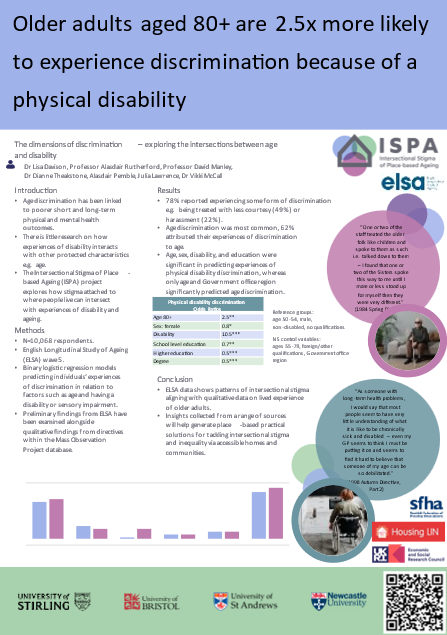Celebrating a Year of the Intersectional Stigma of Place-Based Ageing (ISPA) Project

“Celebrating a Year of the Intersectional Stigma of Place-Based Ageing (ISPA) Project” (opens new window) offers a comprehensive look into the project's objectives and its commitment to fostering inclusivity and highlights the ISPA network and its dedicated team.
This review sheds light on the project's progress during its first year, aimed at gaining deeper insights into the complex process around stigmatisation.
This one-year review includes:
- Examining the representation of disability in homes and neighbourhoods
- Establishing connections between 'ageing-in-place' and the lived experiences of stigma.
- Collaborative efforts, including building a cohort of disabled community peer researchers.
- Addressing inequalities via organisational change, policy and practice
Furthermore, this one-year review outlines the advancements made in establishing an Inclusive Living Alliance, supporting the implementation of neighbourhood enhancements that the Housing LIN is proud to support.
 To coincide with this anniversary, we are delighted to publish a new Housing LIN guest blog by Vikki McCall, Professor of Social Policy at the University of Stirling and principal investigator on the ISPA project.
To coincide with this anniversary, we are delighted to publish a new Housing LIN guest blog by Vikki McCall, Professor of Social Policy at the University of Stirling and principal investigator on the ISPA project.
The blog presents an overview of their activity over the past year and shares how the project team has focused on building evidence and understanding around home and environmental modifications. These efforts aim to encourage interventions for inclusive approaches that support people to age well within homes and communities across England, Scotland, and Wales.
ISPA Activity to explore
 (opens new window)The ISPA poster highlighting our year 1 analysis was presented at the English Longitudinal Study of Ageing conference (May 2023) and generated a lot of interest, and the next steps of ISPA are accessing and gaining insights from further datasets. The quantitative analysis (opens new window) has focused on preliminary analysis of English survey data, which is already giving interesting insights to representation of disability in homes and neighbourhoods.
(opens new window)The ISPA poster highlighting our year 1 analysis was presented at the English Longitudinal Study of Ageing conference (May 2023) and generated a lot of interest, and the next steps of ISPA are accessing and gaining insights from further datasets. The quantitative analysis (opens new window) has focused on preliminary analysis of English survey data, which is already giving interesting insights to representation of disability in homes and neighbourhoods.
See our supporting video below:
Exploration of qualitative diaries from the Mass Observation Project (MOP). This has resulted in us reading and analysing 1,289 diaries across the year across these key themes.
Co-production and building a cohort of disabled Community Peer-Researchers (CPRs) is at the heart of the ISPA Project. We have established a thorough process and training support for our group of older (45+) CPRs who will participate and conduct research on the lived experiences of disabled people.
Year 1 has focused a lot on building our ethical processes and building data collection methods. We have established four groups of CPRs, including three in Scotland and one in the South of England. Year 2 will see us establish further groups in the North of England and Wales. Please contact Dr Dianne Theakstone to get more involved.
